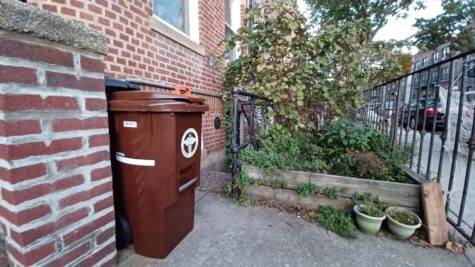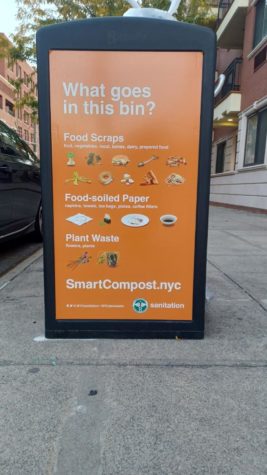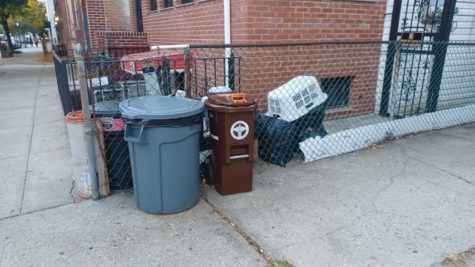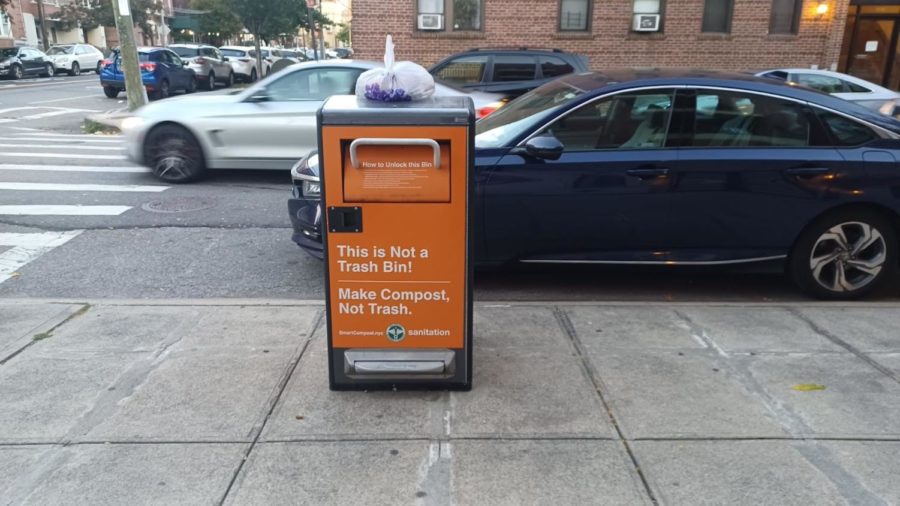Curbside Composting: An Environmental and Sanitation Revolution in Queens
Queens is making composting easy, giving New Yorkers a way to help their communities and their trees prosper.
Pictured is a communal street bin in Queens, available to all residents and passers-by.
The New York City Government has begun making composting simple and affordable for all citizens. Residents are provided with an undemanding course of action to clean their streets and beautify their parks. Local advantages stretch into global gains. By removing organic waste from landfills into parks and gardens, the environmental benefits are expected to be immense.
On October 3rd, 2022, the New York Department of Sanitation began its weekly curbside composting program. The service is available to all residents — with no signup required and no strings attached. Single-family homes can order bins, while buildings with 10 units or more will automatically be given large composting containers. Weekly collection trucks pick up compost from private and communal bins.
The program was initiated in Queens due to the numerous private yards owned by residents. Dead leaves and other garden waste comprise an immense amount of collected compost.

From the kitchen, fruit and vegetable scraps, bones, and food-soiled paper are all welcomed in composting bins.
Environmental protection is a major concern that triggered the program. According to the United Nations Environment Programme Food Waste Index Report 2021, unconsumed organic waste makes up for 10% of greenhouse emissions globally. In America, over a third of trash can be composted, but instead gets thrown into dumpsters and spewed into landfills.
Organic waste that sits alongside trash and plastics produces methane, a greenhouse gas 25 times more potent than Carbon dioxide. Studies done by the Environmental Defense Fund have shown that the short-term effects of methane are particularly detrimental. During the first 20 years of release, the greenhouse gas warms the Earth 80 percent more than Carbon dioxide.
Most residents, however, are more concerned with the local benefits acquired by composting. All collected compost will be put to the benefit of New York City inhabitants by beautifying public parks and gardens. The United States Environmental Protection Agency describes composted organic waste as an exceptional soil enhancer, even referred to as “black gold” by farmers due to the increase in agricultural yields.
Georgiana Marin, a resident of Astoria, Queens, has begun composting with the program every day. As she puts her apple cores and cucumber peels into her brown bin, she imagines the parks prospering from her discarded waste. “In the peels, there are nutrients for plants and trees,” she said. “There is no need for harmful fertilizers with bad chemicals.”
Pesticides and fertilizers pose immense risks to non-targeted plants and animals and cause extreme water contamination. A 2009 study on the impact of pesticides found that pesticides and fertilizers are often toxic to the surrounding environment, and specifically detrimental to insects, plants, birds, and fish. Pesticides alter habitats to become hostile and deadly to the animals that create a prosperous ecosystem.
The benefits extend beyond the gardens of Queens to the paved streets and brick buildings. Assistant Commissioner of Public Affairs in the Department of Sanitation Josh Goodman said that better sanitation and decreased rat abundance are definite advantages of the curbside composting program. “If the organic material is in a separate, sealed container, rats have a much harder time getting into it,” he noted in a New York Times interview.
While the New York City composting program was created to aid the cleanliness of the city, the concept, along with its gains, has been used around the world for generations.
Another New Yorker, Maria Rodica Stan, grew up composting on a Romanian farm. For her family, composting is a tradition that has been passed down for hundreds and hundreds of years. They spread food scraps and animal manure on plowed fields during the fall, making them ready to sustain prosperous yields during the spring. “We didn’t use any expensive chemicals,” said Stan. “The corn, tomatoes, beans — everything was amazing.”
Stan trusts this hundreds-of-years-old traditional process. By returning to traditional means, Stan says that New York City is undergoing major progress.
Leaning back on the natural ways of the past is a trend that can be documented in countless human activities. Food, clothes, transportation — everything is undergoing a change towards a more environmentally conscious path. Composting is simply another natural tradition that has gained popularity through this movement.
For Sonja Storz, a new Queens resident, the curbside composting program has a dual purpose. “It lets me reduce my waste footprint,” she said. “We are and should be conscious about how much waste we are contributing to our communities.” Storz is excited by the full-circle nature of composting. Her vegetable scraps are aiding the Queens community by replenishing the dirt that made them.
Storz remarks that the program’s benefits aren’t just for the greater good of the city. “It also helps me too,” she said. “It reduces the food going to my trash which can create problems when you are living in a tiny apartment.”
While personal bins can be ordered from the Department of Sanitation, larger communal ones are being installed on street corners and in front of large building complexes. Storz has incorporated bringing her food scraps to one such bin into her daily routine. The efficiency of the process surprised her. “It’s extremely easy. The instructions for it are all listed right on the bins themselves.”

While Sonia Storz began composting with the program when the installation of a bin, what she saw half a block away sparked her interest — there were residents who have been finding their own ways to lessen the amount of organic waste they put in landfills for years, independent from the New York City Government.
Gabriel Albano resides in an extremely sustainable house. He flushes toilets with rain water and takes showers heated by the sun. Years before the curbside composting program, Albano fitted his sink with a food processor that grinds up organic waste and sends it straight into the sewers. “There are no polluting trucks involved,” he remarked. “Everything goes in the food disposal without the carbon footprint.”
Another limitation of the program is that it shuts down for the winter season — halting in December and continuing again in March. Gabriel Albano initially began composting in his garden and ran into the same problem. “We were sad we couldn’t do it all year long,” Albano said. “The temperature is not good enough to keep the process going.”
Georgiana Marin – though an avid supporter of the program – agrees that some changes are necessary. “More education is important. Officials need to educate more people because many don’t even recycle; they don’t think it’s necessary. The government needs to convince more people and make it better known,” she said.
Sonja Storz agrees with the need for more clarity. On her way to drop off her compost, she sometimes needs to help her neighbors who are “battling with the openings” or “trying to throw trash into them.” She still isn’t certain what kind of material — paper or plastic — to use in order to collect her food scraps. “I’d like to see more clarity about what they accept and what they don’t,” she said.
Luckily, public education and awareness of the program is likely to increase as time goes on. Flyers are being posted in buildings that are home to hundreds of residents that inform people regarding composting availability and proper guidelines to follow.
Queens building management on 30-81 21st Street sent unit owners and tenants their own copies of the city composting guidelines. This includes a list of compostable items, instructions on collection, and drop off guidelines. Residents were told to bag their waste and ensure that they firmly closed the bins. The building staff were directed to separate trash from yard waste and set the building’s bin at the street curb according to the collection schedule.
Along with further education, the city is looking to expand this program to other boroughs. New street bins are being placed in Manhattan, Bronx, and Brooklyn. Queens is only a starting point for the program. The goal is to provide curbside pickup for the entire city.

The program is a first step in expanding broader environmental efforts and appeals to the immense potential for good in New York City citizens. “The program encourages people to use it and compost when it’s something that they don’t have to personally pay for,” Storz said. “People will do the right thing if it’s easy enough for them.”
For Sonja Storz, a new Queens resident, the curbside composting program has a dual purpose. “It lets me reduce my waste footprint,” she said. “We are and should be conscious about how much waste we are contributing to our communities.”
Rossitsa Mina Petrova is an Editor-in-Chief for ‘The Science Survey,’ where she is responsible for revising and editing the articles of her peers....

